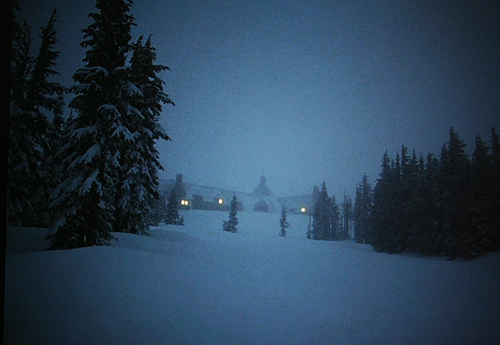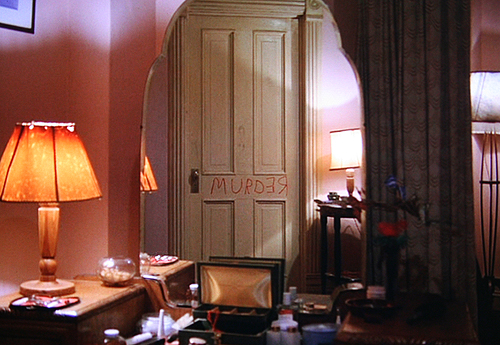The Shining part 7: 4pm
Jack is down for the count, locked in a pantry by his wife, who, moments earlier, was incapable of the slightest act of self-preservation. This is, surely, the protagonist’s low point: all hope is lost, there’s no way he’s ever going to get out of this pantry.
Or is there?
Delbert Grady, whoever he is, shows up, or at least his voice does, to express his disapproval of Jack’s inability to act. At this moment, Delbert Grady is the spokesman for the protagonist, the mysterious entity Lloyd referred to earlier as the man buying Jack his drinks.
The thing you have to understand at this point is that Kubrick’s narrative strategy, up ’til now, is to suggest that there may not be any actual ghosts at the Overlook. Danny’s visions may be an expression of his gift and Jack’s visions may be an expression of his rage. Lloyd and Delbert, one could say, are no more or less than whatever Jack needs to see in order to talk himself into killing Wendy.
(And here’s a thought: Wendy was the name of the girl in the Peter Pan stories, the girl whom the Lost Boys recruited to be their mother. Well, the Wendy of The Shining has certainly devoted her life to taking care of boys who have not grown up, which would make Jack’s murderous rage an impulse of matricide.)
Delbert Grady, in spite of being a ghost, or in spite of being a figment of Jack’s imagination, doesn’t actually come into the pantry with Jack to talk about his situation. He stays outside and, in his English-butler way, taunts him. To me, this argues all the more heavily that Delbert isn’t any kind of proper ghost at all, that he remains on the other side of the door of Jack’s prison because he is acting the role of the disappointed parent, which is, ultimately, what Jack requires him to be at that moment. Jack is penitent to his father-figure (since Delbert is both the mask of the protagonist and the previous caretaker in Jack’s mind) and his father-figure forgives him, in his distant-father manner, and frees him from his imprisonment, so that he can get on with the job of killing his mother-figure.
The key thing about the scene, and the reason why it’s the fulcrum of the whole movie, is that Delbert Grady is physically capable of letting Jack out of the pantry, and does so. This is the first indication, and arguably the only one, that the ghosts are “real,” and that there is an outside force, the invisible protagonist, operating on Jack’s mind.
Except, of course, that The Shining is also about psychic powers, which means that Jack, in whatever psychological maze he might be in, may also have the ability to unlock the pantry himself, once his imaginary father-figure has chastised and forgiven him.
(It occurs to me now that The Exorcist, which is a strong model for The Shining, could also be said to have an invisible protagonist, that the mother and the priest are, in fact, antagonists standing in the protagonist’s way. The invisible protagonist of The Exorcist arguably gets what it wants, which is to destroy Father Merrin — the fact that Father Karrass takes the protagonist into himself and then throws himself out a window is mere plot resolution. The girl in The Exorcist isn’t even a character, she’s the maguffin.)
While Jack gets out of the pantry, here comes Hallorann to the rescue! The little scenes of Hallorann racing up the mountain in his snow-cat are an echo of the title-sequence, the difference being that now Kubrick puts us inside the vehicle’s cab, giving us close-ups of Hallorann as he trudges his way up the mountain. The title sequence was designed to show that Jack is a tiny speck in this huge wilderness, but the Hallorann-to-the-rescue scenes are meant to illustrate that Hallorann is the master of this domain, that everything will be all right now now that the knight is coming to rescue the damsel.
Meanwhile, up in the family apartment, something is happening to Danny. While Wendy sleeps, Danny walks the room, chanting “redrum” in his Tony voice. He’s seen this word, “redrum,” in his visions, and now he’s chanting it. What’s really happening here? Danny, like Jack, is trapped in a psychological maze. He’s been confronted by a trauma, the old woman trying to strangle him, and it has thrown Danny out of his own mind, allowing his guardian, Tony, his own kind of father-figure, to take over. Tony, like Delbert, is the only one who can free Danny from his psychological pantry at this moment. What’s happening in the “redrum” scene is Danny/Tony working out a psychological puzzle, and the puzzle is: what does “redrum” actually mean? Danny/Tony writes the word out on a door, and something interesting happens: his voice changes from Tony to Danny. Tony cannot wake Wendy up, but Danny can, and does, screaming “redrum!” over and over. Wendy wakes up and sees Danny/Tony’s word in the mirror, which is, of course, not “redrum” but “murder.”
What’s happening here? Danny has been confronted with the most nightmarish concept possible: not ghost-girls, not a dead woman in a bathtub, but the thing that those visions mask: his father’s rage and desire to kill his mother. No child could be expected to grasp the concept of a murderous father, and Danny does what any bright child would: he abstracts the concept and turns it into symbols. The dead girls, the woman in the bathtub, the elevator full of blood and “redrum” are Danny’s attempts to grasp the reality of his situation: his father wants to kill his mother, and is willing to kill him as well in order to achieve his goal. He can’t grasp the concept of “murder” so he flips it around and makes it “redrum.” In this way, he both sounds the alarm and also retains a shred of innocence. He doesn’t need to say “Dad is going to murder us,” he only needs to write “redrum” and lets Wendy put together the final pieces. His trauma has been worked through, order is restored, he’s made his way through his psychological maze, and now his personalities can merge in his new reality.
Just in time too, because here comes Jack with an axe! When Jack succeeds in bashing in the door to the apartment, he says “Wendy, I’m home,” an obscene perversion the evening greeting of the paterfamilias, and proceeds to corner them in the apartment bathroom (another bathroom as a psychological terminus — the third in the movie, if you count the bathroom in the apartment in Boulder where we first see Danny talking to Tony).
The final suspense sequences of The Shining remind me a lot of the third act of Scorsese’s Cape Fear. In both cases, they are genre sequences made by directors not known for their mastery of genre. Kubrick doesn’t care that much about the mechanics of the horror narrative, and Scorsese, I think, doesn’t care that much about the mechanics of suspense; both directors have bigger fish to fry. In the case of each movie, the final suspense sequences are “good enough” in concept, then executed with enough flair to make them work, but in each case they are hardly the point of the larger narrative.
Just as Jack is about to lay claim to his prize of killing Wendy, Hallorann shows up to save the damsel. Jack, who, in this fairy-tale narrative would be the dragon (or, as he explicitly states it, the Big Bad Wolf) then must go tangle with the brave knight who has come to save the day.
Which, to the shock of the audience, he does with no trouble at all. Hallorann never even gets in a punch or a squeak of a resistance as Jack kills him with one blow. This shocking turnaround traumatizes Danny (who has hidden nearby) but does not force him into a Tony-state, which has been the case in the past. No, Danny is now a complete person, he is now cognizant of his situation, and he acts sanely: he runs like hell from the crazy man with the axe. He’s capable of out-running Jack because Jack is wounded from his earlier confrontation with Wendy; he still sports a limp from falling down the stairs. So we see that it’s not just Danny successfully out-witting Jack, it’s Danny building on the wound that Wendy inflicted earlier; the mother and child work together to slay the Big Bad Wolf. The important thing is that Danny has run the maze successfully, while Jack was too tied up with his “work” to venture out of his man-cave, and so Danny is prepared to win this battle of wits while Jack is still resolutely lost. Danny has lived at the Overlook in a way Jack has not; Jack has lived only in his head while Danny has ventured out into the world, and, more importantly, has reconciled the trauma in his mind in a way that Jack has never even approached. And while Jack is lost in the maze, I am reminded, again, of Cape Fear, as both Big Bad Wolves (both Max Cady and Jack Torrance explicitly refer to themselves as such) end their lives babbling nonsense, their capacity for language, their last shreds of humanity, gone.
The protagonist of The Shining does not achieve its goal, but it does get a consolation prize: Jack, who is now literally frozen in the way he was only metaphorically frozen before. The enigmatic last shot of the movie, of Jack appearing in a photo in the Overlook lobby from 1921, suggests many things, but to me means simply that Jack is now a permanent resident.



The first time I saw The Shining (I don’t remember how old I was, but certainly too young). I was so mad about the scene in which Delbert frees Jack from the pantry. I felt like the movie was “cheating” at that point. It almost completely ruined it for me. I don’t recall if I just felt that Delbert had been merely a hallucination and shouldn’t have been able to act, or if that he was a ghost and that ghosts weren’t allowed to do things like open doors, but I strongly remember the feeling of the movie itself cheating on whatever I had decided the established rules were.
Excellent reading of one of my favorite films, thanks for sharing. I’ve always loved the ambiguity of scenes like the one in which Grady lets Jack out of the pantry. And what to make of the fact that Wendy, too, finally sees the ghosts? Rather than finding fault with these inconsistencies (if that’s what they are), I find it much more fun to try to figure them out. Which isn’t possible, I think. Personally I find this delicious and wish that more filmmmakers would embrace the practice of not explaining everything, or at least leave more puzzles in their films for the audience to ponder (as David Lynch has so often done).
Another reason that Halloran’s rescue attempt is important is that it provides the means of escape. He has to make it up the mountain, or there is no snow cat to get away in. So in a way he DOES rescue Danny and Wendy, since–as you point out–the hotel is the protagonist: Why assume that they would be safe merely because Jack is gone?